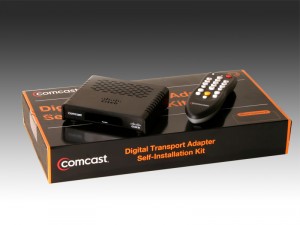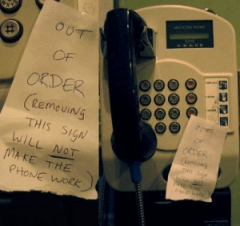 More than 20 cable systems across Kansas will be terminating television and broadband service after a private equity firm, working with former Bresnan Cable executives, deemed them unprofitable and not worth upgrading.
More than 20 cable systems across Kansas will be terminating television and broadband service after a private equity firm, working with former Bresnan Cable executives, deemed them unprofitable and not worth upgrading.
Residents of Conway Springs (pop. 1,250), Chetopa (1,125), Sharon (158), and Harper (1,473) are among those who will find their cable and broadband service discontinued in the coming weeks. Abandoned cable subscribers are being told to buy satellite dishes to continue watching television. No immediate broadband solution was available.
Allegiance Communications, which provides cable TV, broadband Internet, and VOIP telephony services to rural and mid-size markets in Arkansas, Kansas, Missouri, Oklahoma, and Texas was acquired last month by former executives at Bresnan Communications, itself bought out by Cablevision Industries. The deal was largely financed by BBH Capital Partners, a New York City-based private equity firm.
The purchase by BCI Broadband orphaned nearly two dozen cable systems that Allegiance owned and operated, but were excluded from the sale. Subscribers are being notified they are about to be switched off permanently in letters signed by Allegiance executives.

Several former Bresnan Cable executives are behind BCI Broadband.
The service will leave rural Kansans without broadband service, cable television, or an alternative to AT&T and other independent phone companies operating in the state.
“This was not an easy decision for us, nor is it one that we came to hastily. The costs of doing business in Conway Springs can no longer be profitable,” Allegiance wrote in its letter, according to KSNW-TV.
Local officials in affected communities are rushing to find an alternative, appealing to providers like Southern Kansas Telephone to see if they can pick up where Allegiance left off, but the phone company has yet to respond.
Allegiance claims the outdated cable systems served few subscribers and the new owners were not interested in investing funds to upgrade them.
BCI Broadband is a new company run by former executives forced out of Bresnan Communications when the company was sold to Cablevision. BCI Broadband claims it wants to invest in system upgrades to improve service to remaining subscribers.
“Historically when we have purchased cable systems and invested in upgrading to the latest technology in markets like Shawnee, that has inevitably led to more customers and the need for more staff,” said Shawn Beqaj, vice president of public and government affairs for BCI Broadband. Beqaj was the former vice president of public affairs at Bresnan.
There has been an accelerating trend of industry consolidation among rural cable operators, particularly by private equity firms that are interested in the stable earnings cable operators usually generate.
GTCR, through its portfolio company Rural Broadband Investments LLC , separately announced its plans to acquire NewWave Communications Co., in what it hopes is just the first of a series of acquisitions. NewWave’s purchase was financed by debt capital from SunTrust Robinson Humphrey, Inc., and Goldman Sachs Bank USA.
[flv width=”480″ height=”290″]http://www.phillipdampier.com/video/KSNW Wichita Small towns losing cable service 2-7-13.mp4[/flv]
KSNW-TV reports more than 20 Kansas communities will lose television and broadband service when Allegiance Communications switches off the cable systems. (2 minutes)


 Subscribe
Subscribe
 Verizon last week surprised 20 Philadelphia families scheduled for installation of its fiber optic service FiOS on Valentine’s Day with flowers, chocolates and Verizon-labeled canvas bags.
Verizon last week surprised 20 Philadelphia families scheduled for installation of its fiber optic service FiOS on Valentine’s Day with flowers, chocolates and Verizon-labeled canvas bags.
 Nearly four months after Hurricane Sandy struck Manhattan, many customers are still waiting to get their phone and Internet service restored.
Nearly four months after Hurricane Sandy struck Manhattan, many customers are still waiting to get their phone and Internet service restored. That was an improvement over how the company performed in October and December, 2011, where prolonged service outages provoked the PSC to eventually fine Verizon $400,000.
That was an improvement over how the company performed in October and December, 2011, where prolonged service outages provoked the PSC to eventually fine Verizon $400,000. The Bloomberg Administration strongly disagrees with the PSC’s handling of outage information.
The Bloomberg Administration strongly disagrees with the PSC’s handling of outage information.